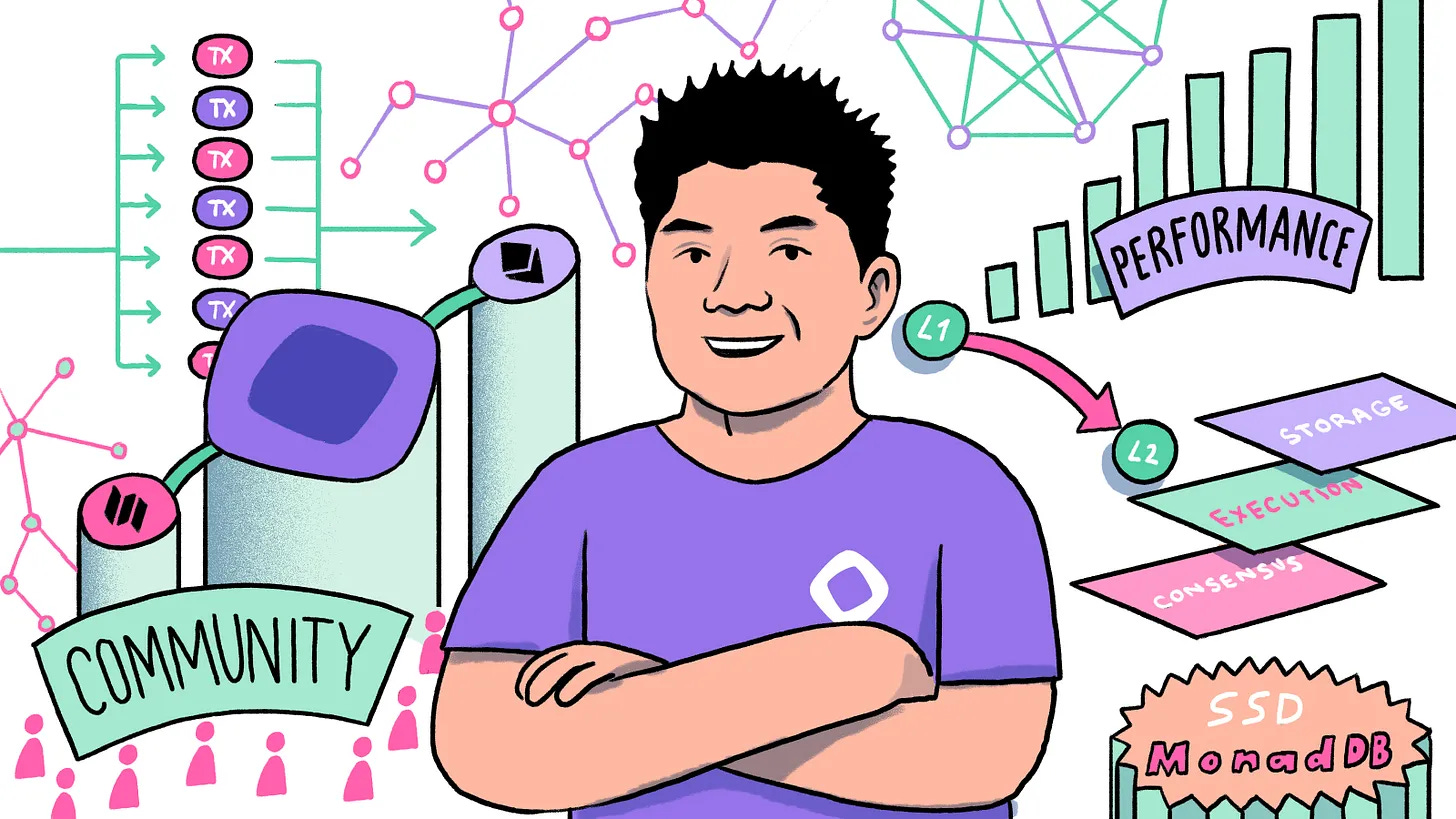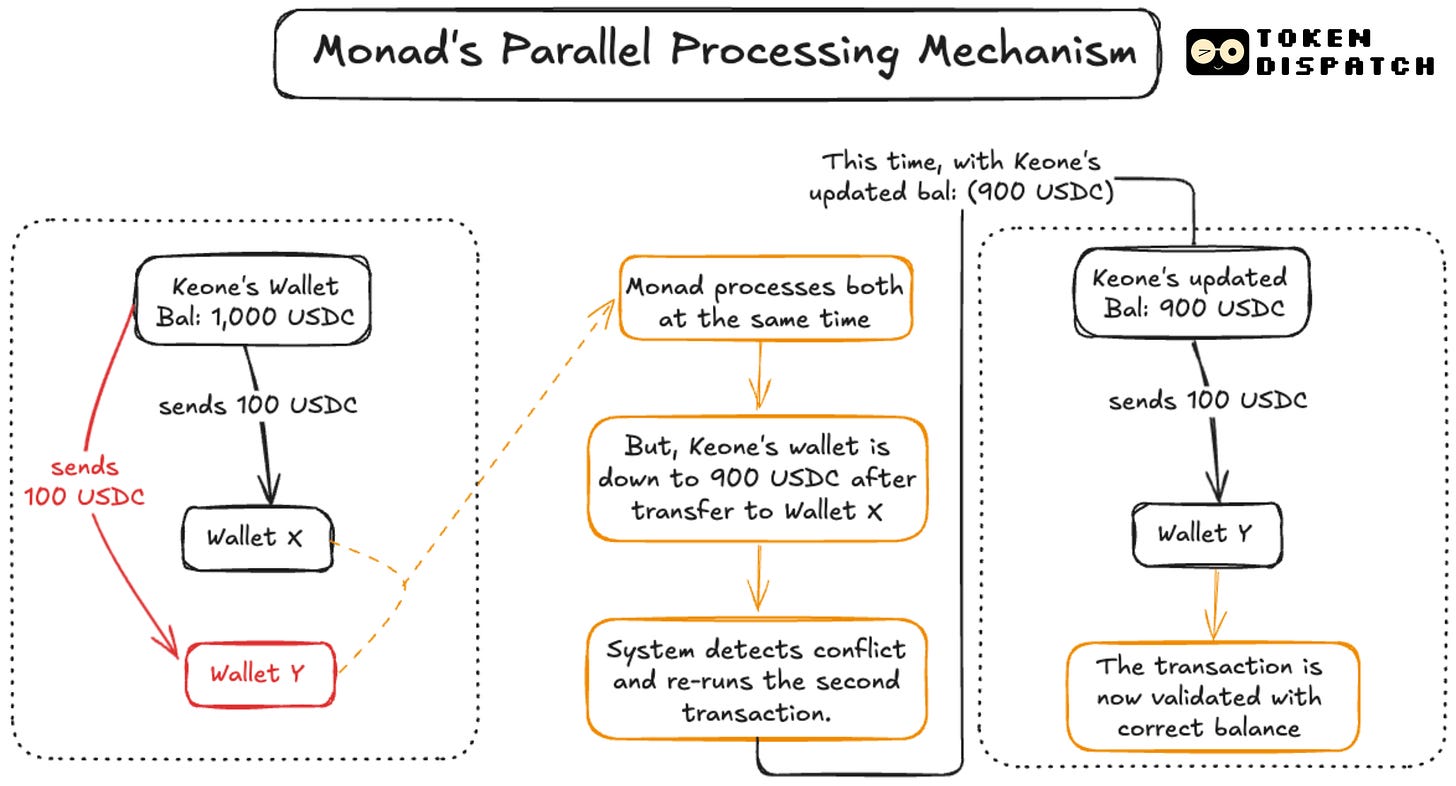Hello!
In 1997, Adam Back invented Hashcash to stop email spam. In 2008, he almost deleted Satoshi's email about Bitcoin. Today, his "spam filter" powers a $2 trillion revolution, and he predicts it's heading to $100 trillion.
Read all about him in yesterday’s edition.
Every Saturday I dive into a podcast by our partners at Decentralised.co and share what caught my attention.
I reflected this week on Saurabh Deshpande’s conversation with Keone from Monad. It brought into spotlight a new L1 blockchain aiming to solve this old puzzle. Not with modular architectures or rollups, but by rebuilding the very engine of execution.
Listen to the full episode here.
One of the common things all crypto projects have struggled to solve has been speed along with sufficient decentralisation.
Every Layer 1 blockchain, whether Bitcoin, Ethereum, Solana or a fresh L2 rollup, has, at some point during their journey, stared down the same enemy: the brutal mismatch between global decentralisation and lightning-fast execution. And every few years, a new team claims to have finally cracked it.
This is the oldest unsolved problem in blockchain: speed versus trust, performance versus simplicity. L2s skirt the problem entirely by moving execution off-chain, but at the cost of new complexity and cross-chain headaches.
Monad, an Ethereum-compatible L1, claims to solve this by making the EVM faster without breaking compatibility or turning into a modular maze. Their approach? Parallel execution at the base layer, built in from scratch.
Keone, Monad’s co-founder and CEO, comes from the world of high frequency trading where speed is everything. At Jump Trading, he built systems that could interpret and react to market data in microseconds.
With Monad, Keone brings that same obsession into crypto.
"There was a lot of work involved in building this really performant system … squeezing out any bit of latency... doing so in a generalisable way so the trading system could trade many, many different things".
The pitch: a chain capable of handling over 10,000 transactions per second, with one-second block times and single-slot finality. Not by layering rollups or adding new bridges, but by rebuilding the EVM itself to support full parallel execution.
At the time of the conversation, Monad was gearing up for its public testnet launch, a milestone that has since materialised.
What Monad is trying to pull off is tough. Ethereum has spent years avoiding parallel execution, for a reason: determinism, Keone says. Every transaction must execute in the same order, everywhere, to avoid state conflicts and ensure network-wide agreement.
In chains like Ethereum every computer (or node) must process transactions serially, one after another. That’s not how modern computers work, though.
Your laptop runs Spotify, Chrome with 47 tabs (okay, mine has a couple dozen more open), Slack, and somehow still responds when you click something. Yet, a blockchain with the largest developer network works like 1995-era computing.
Monad wants to answer this with “optimistic parallel execution”.
Keone explains: "Run a bunch of transactions all at the same time... keeping track of any of the inputs to those transactions, as well as the outputs... and then commit or re-execute depending on whether things changed".
He explained this better with an example.
Say Keone’s account, which holds 1,000 USDC, sends 100 USDC to both Wallet X and Wallet Y, one after another but within the same block. Each transaction, run in parallel, believes the balance in Keone’s wallet starts at 1,000 USDC, which is clearly inaccurate. Monad’s system detects the conflict after execution and re-runs the second transaction with the updated state of Keone’s wallet showing 900 USDC (after the transfer to Wallet X).
If this system works as it claims to, this could be a huge win. But it also appears to carry some traces of old complexity. Speculative execution is infamously tricky, even in conventional databases. Conflict resolution, rollback, and state caching must work perfectly to prevent nasty surprises.
Monad’s other major change is deferred execution: splitting consensus and execution into separate tracks.
On Ethereum, the leader computer does all the work: process all transactions before telling the others what happened. Monad flips this around: first, all the computers agree on the list of transactions, and only then do they process them. This lets Monad handle more work at the same time, without slowing things down.
Keone has also rethought storage with MonadDB, their in-house state database.
It ditches traditional storage engines like RocksDB for a bespoke system designed to reduce latency when reading Ethereum’s massive Merkle tree. It’s part of a broader trend where projects like Sonic and MegaETH have also taken similar approaches by switching to custom-built databases.
"The common admonishment in software engineering is: don’t build your own database," Keone said. "And that’s exactly what we did".
Monad is proposing something few have attempted: parallel execution, on-chain, in the base layer. Now that the testnet is live, developers can finally see for themselves if this complexity delivers real-world performance, or if it simply shifts the problem elsewhere.
Faster decentralised exchanges, real-time on-chain trading, true order books have all been long-held dreams in DeFi. Adoption will depend on factors beyond speed. Monad’s community effort recognises this. "In the early days, the community is the product," Keone said. "We just kept doubling down on that... making the community an enjoyable place".
Speed and lower latency will matter only if developers care. And if users notice. The new complexity could scare away the people who were meant to build on it. Crypto’s history is littered with fast chains that no one used.
The catch for Monad in making it work would be in bringing the community on board its idea and making them believe what they believe in.
I’ll be watching closely, the long quest for speed in blockchains.
See you next week.
Off to some cafe-hopping for the weekend, now.
Prathik
Want to hear Keone's full argument and how Monad is solving the rollback and state caching issues that are native to speculative execution? The complete conversation carries the answers to this.
Token Dispatch is a daily crypto newsletter handpicked and crafted with love by human bots. You can find all about us here 🙌
If you want to reach out to 200,000+ subscriber community of the Token Dispatch, you can explore the partnership opportunities with us.
Fill out this form to submit your details and book a meeting with us directly.
Disclaimer: This newsletter contains analysis and opinions, not financial advice. Trading crypto involves substantial risk - your capital is at risk. Do your own research.





